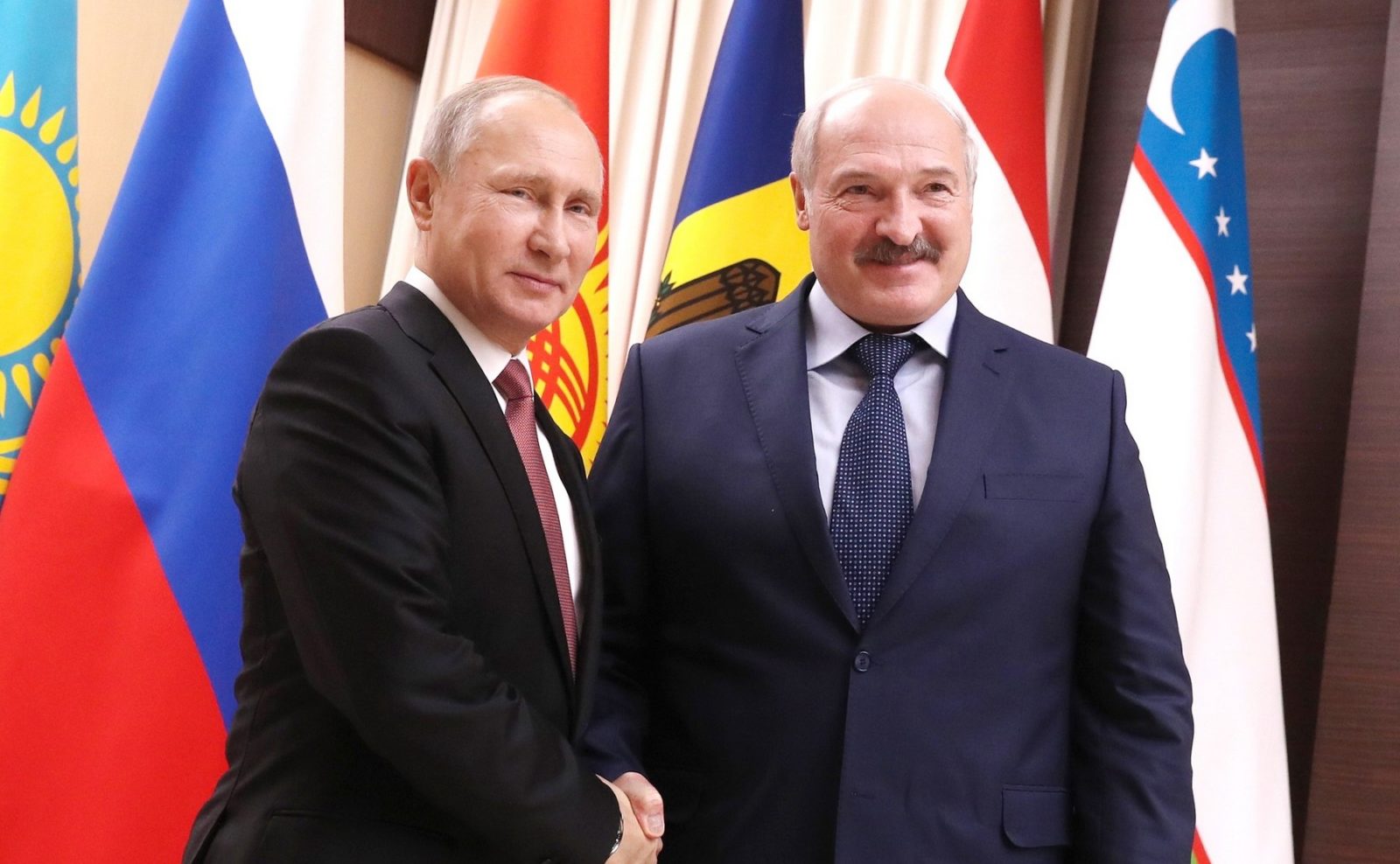On 4 June, Russian veterinary and food inspectors announced a temporary ban on imports of Belarusian milk and dairy products in retail containers larger than 2.5 litres, effective 6 June. This initiated yet another dispute in Belarusian-Russian relations, which have been deteriorating following Belarus’s refusal to participate in the Kremlin’s foreign policy adventurism. Moscow is reviewing its policy towards Belarus, while Minsk is trying to work out an adequate response to the new Russian strategy.
In Moscow’s arms
Belarus’s dependence on the Russian economy has not diminished in recent years: In 2017, 51% of foreign trade in goods (32.4 out of $63.5 billion) was with Russia, including 44% of exports ($12.8 billion) and 57% of imports ($19.6 billion). Leaving out Belarusian exports of oil and oil-derived chemical products (approximately 20% of Belarus’ exports, which originate in Russia), then it becomes ever more apparent how dependent Belarus is on on Russia. Moreover, Russia is still the largest investor in Belarus, accounting for 38% of all foreign direct investment in 2017 ($7.6 billion).
The nature of Belarus’s dependence on Russia has, however, changed slightly in recent years. The share of services in total exports from the smaller country grew from 17% in 2013 to 22.8% in 2016, with 68.4% going outside CIS countries. The increase in the share of services reduces Belarus’s dependence on the Russian market, but the most important thing is that unlike in the past, Belarus is much less dependent on Russian energy subsidies. The level reached 20% of Belarusian GDP in the 2000s, but dropped to 4.5% of GDP in 2017 (according to Belarusian experts) or $2.4 billion (as assessed by the Russian Ministry of Finance). The withdrawn subsidies were compensated for not with revenue but with loans, which resulted in an increase of Belarusian sovereign debt.
Earlier, Belarus depended primarily on the benevolence of the Russian leadership and its subsidies, while today the country is fighting for market access and compliance with legal agreements between the two countries. However, the fate of the agreements is uncertain due to the growing political divide.
Disagreements over the Ukrainian crisis
Belarus refrained from supporting Russia’s assertive and overbearing policy after the onset of the Ukrainian crisis in 2014, and has since been promoting itself as a ‘negotiation platform’ and ‘provider of regional stability and security’.
While maintaining its status as a Russian ally and showing the required level of support, exhibited for example in its vote on the issue of human rights in the annexed Crimea at the UN General Assembly, Belarus also declared that its territory would not be used for any attack on Ukraine. Along with Kazakhstan and other partners, Belarus blocked Russia’s attempts to introduce trade sanctions against Ukraine within the Eurasian Economic Union and the CIS. Belarusian enterprises processing foodstuffs from EU countries reduced the negative impact of Russian reciprocal sanctions on some EU producers (primarily from Poland and Norway). Finally, Belarus has become an important trade and transit hub for Ukraine, while supplies of Belarusian fuel and dual-use goods have become an important factor ensuring the combat efficiency of Ukraine’s armed forces.
The Belarusian leadership has adopted a new defence plan and military doctrine, based on the assessment of a possible Russian military threat. Despite the country’s commitments as part of the Union State of Russia and Belarus and the CSTO, this document stipulates a ‘multi-vector’ approach to ensuring the military security of Belarus.
Throughout 2014-2015, the Russian leadership made every effort to persuade Minsk to support its foreign policy. One of the main such initiatives was the decision to create a military base on Belarusian territory. Russia took advantage of Lukashenko’s vulnerability during the 2015 presidential election and unilaterally adopted the agreement at the level of the government and president, to be signed by the Belarusian party. However, Belarus ignored the proposal, having informed Moscow it was undesirable to have Russian military infrastructure on Belarusian territory.
Moscow’s unilateral actions
After that, Moscow started working on a new strategy towards Belarus. The Kremlin tried to limit its dependence on Belarus and create leverage in an attempt to narrow down the Belarusian leadership’s room for manoeuvre.
As part of this approach, Russia began deploying troops on the Belarusian-Russian border. The presence of soldiers in Smolensk and Bryansk Oblasts weakened the role of Belarus on the western strategic flank. In addition, Russia has started to replace Belarusian products in the defence industry, on a large scale. Not all of the efforts have been successful, but they are aimed at reducing the role of Belarus as a military-technical and military-political partner. Most notably, the Russian leadership refused to attend the joint strategic military exercise Zapad 2017 (West 2017).
Traditional trade wars are not the only leverage employed by the Kremlin. Russia is also threatening to restrict Belarusian citizens’ freedom of movement across the Belarusian-Russian border. In 2016, the FSB Border Guard Service virtually blocked the Belarusian-Russian border for third-country nationals travelling to Russia across Belarus. The daunting threat of restricting the movement of Belarusian citizens themselves has become a matter of serious concern for the leadership in Minsk. Mass off-the-books employment in Russia for people from eastern Belarus, and cross-border business schemes, make free access to Smolensk and Bryansk Oblasts an essential factor for social and political stability in these regions.
Russia is not just resorting to new leverage, but also disabling Belarus’s attempts to escape this pressure. For example, in response to Belarusian initiatives to settle the border issue, Moscow has proposed to create a single visa area. That would deprive the Belarusian party of autonomy in deciding on the entry of third-country nationals, and could make it impossible for Belarus to serve as a negotiation platform on the Ukrainian issue. Moscow is putting forward extremely stringent conditions on the real-time exchange of information about border crossings within the single visa area. This will in effect mean remote control over the Belarusian border by Russian border guards, which is unacceptable for Minsk.
Last but not least, since late 2015, the Kremlin has embarked on systemic efforts to enhance the use of its soft power in Belarus. In March 2016 a research and educational centre — Russia and Belarus: History and Culture in the Past and Present — was established in affiliation with Smolensk State University. The centre will focus on studying the situation in the border area. Thanks to financial, organisational and other types of assistance from Russia, a network of pro-Russian information resources mostly targeted at the regions (and not Minsk) has been created.
Belarus’s response in the face of uncertainty
The Belarusian leadership is in search of an adequate response to the new Russian strategy; any response will largely take the form of repressive measures. For instance, new amendments to the law on mass media introduce ‘voluntary registration’ of Internet resources operating as mass media and require mandatory identification of users who post content on the Internet and add comments. The changes will be reinforced by tougher fines for ‘illegal media production’, to curtail the efforts of pro-Russian outlets and social media.
At the same time, Lukashenko changed the managerial staff of state-owned media and uniformed services. He demanded that Belarusian state-owned TV channels introduce their own content, rather than copying Russian formats. A ‘soft Belarusianisation’ is under way.
The authorities are also trying to curtail the shadow economy, including off-the-books employment in Russia. A special programme for socio-economic development of the problematic Orsha region has been launched. However, the anti-corruption campaign and the fight against the shadow economy are generating dubious results. The number of bribery-related crimes is still growing, and no one can predict the results of new measures against ‘social parasites’. Initiatives to promote economic growth adopted by the Belarusian authorities have stalled.
Thus, the uncertainties about the future of Belarus stem not only from Moscow’s pressure and the confrontation between Russia and NATO. Poor governance and socio-economic problems are key internal factors that pose a threat to the country’s independence, and the Kremlin is only too well aware of this.
Undoubtedly, the Kremlin will try to take advantage of the Belarusian state‘s vulnerability in the aftermath of major political campaigns (the 2020 presidential and parliamentary elections), and will try to implement its scenario of an inevitable transition of power in the very near future. This challenge can promote further rapprochement between Minsk and the Euro-Atlantic Alliance, and an intensification of cooperation between Belarus, the EU and NATO. If EU and NATO member states are interested in closer cooperation, the parties need to be aware of each other’s capabilities and intentions, in order to manage expectations and achieve a positive result.










